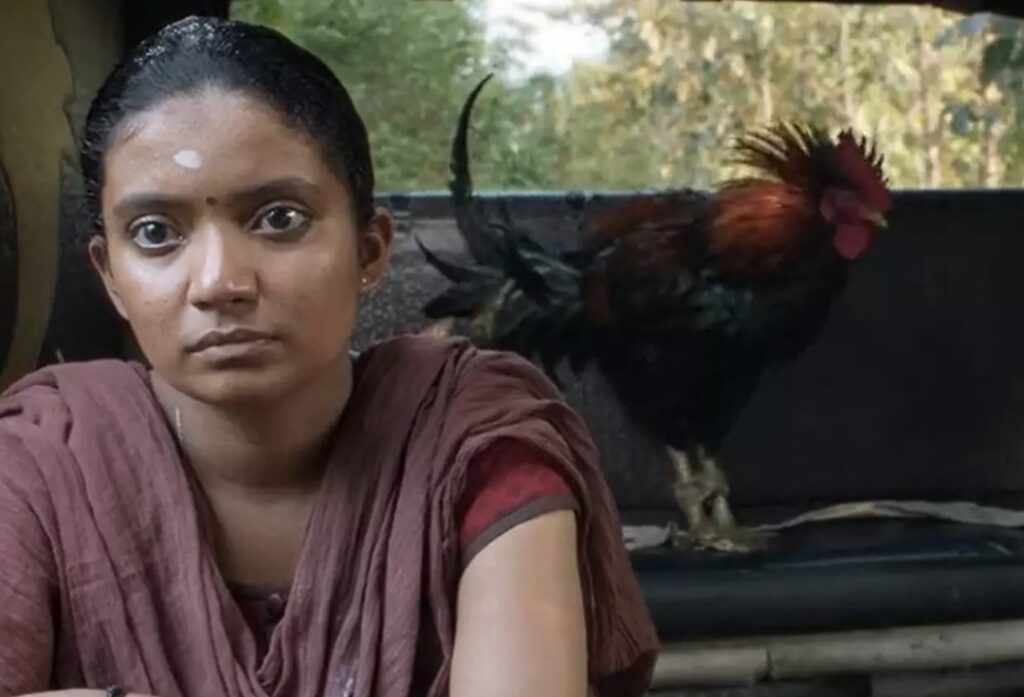PS Vinothraj’s second offering in Tamil, Kottukkaali (2024, The Adamant Girl), is now streaming on Prime Video. This, after its world premiere in the Forum section at the 74th Berlin International Film Festival held earlier this year and its theatrical release in August, 2024.
The film tells the tale of a young woman determined to marry a man from a lower caste, despite her family’s objections and their plans for her. When Meena (Anna Ben) learns that her family has decided against letting her marry her college mate, she reacts by taking a vow of silence. Meanwhile, she is promised in marriage to Paandi (Soori), her maternal uncle. Paandi’s family believes that Meena’s boyfriend has cast a black magic spell on her and so his father suggests a ritual to exorcise her. Both families, along with Paandi’s friends, set out on a journey to a seer they believe can help the troubled girl. A rooster, intended for sacrifice during the ritual, also accompanies them. Along the way, personal wounds and scars quietly begin to surface…
Kottukkaali takes its time to get going as it subverts the need for heavy-handed personal conflict. The film is filled with subtle moments that speak volumes without being excessively vocal. The film highlights how deeply rooted conformist attitudes in society view a girl who defies norms. Meena is excluded from her hopes for a ‘normal’ life because she refuses to follow her family’s dictates. Betrothed to Paandi, she has to face his feeling entitled to her as he believes that as a man, she is rightfully his. Interestingly, while most women in the film subscribe to the patriarchal norms of society, they are also instrumental in addressing critical problems that arise during the journey. The two major obstacles the group encounter are resolved by women, making a powerful statement that brute strength and courage alone do not always overcome life’s simple challenges. Once the family arrives at the seer’s place, we see that people from various social and economic backgrounds visit him, confirming how deeply ingrained such beliefs are in society. These are clever narrative devices employed by Vinothraj, who also wrote the screenplay and they deepen the film’s cognitive impact.
The film’s narrative is multi-layered. The rooster tied to a stone symbolizes Meena’s captivity, both physical and emotional. Shots of men relieving themselves in the open with urine dripping on wild plants, polythene, and dead leaves assert their authority even as a woman must secretly dispose of her sanitary pad to ease her menstrual cramps. Amidst displays of male ego, Meena’s younger brother, Karthi, also a part of the journey, serves as a quiet precursor, raising the question: as he grows up, will he adopt the same attitudes as his elders?
The film is powered by the powerful performances of its two leads. Anna Ben, who remains almost silent throughout, admirably embodies Meena’s resolute character and indomitable spirit. She speaks only one line in the film, yet with that single dialogue, she reveals how deeply she feels and navigates her circumstances. Soori, as Paandi, is a short-tempered soul whose muffled voice exemplifies his bottled-up anger at being rejected. After an uncontrolled display of outrage, his apology to Meena’s father reveals that he is capable of remorse and reflects a deeper vulnerability beneath his bravado. The entire supporting cast is equally compelling with their performances.
Devoid of any background score, the sound design by Suren G and Alagiakoothan conjures the feel of a world distant from the chaos of everyday life, where the quietness is intertwined with the pure sounds of nature. The cinematography by B Sakthivel beautifully captures the clear, sensitive, and discreet portrayal of people in the serene, unspoiled landscapes of rural Tamil Nadu. It’s a languid world of ordinary characters, eventually shaken by the harshness of their situations and one where the camera serves as a silent witness to the ironies that shape the lives of these characters. Ganesh Siva edits the film with a subtle rhythm that acknowledges the passage of time without allowing dramatic moments to linger too long. It ensures that these moments do not detract from the smooth flow of the internal turmoil experienced by the characters in their daily lives.
The film’s open ending places the onus on viewers to decide the characters’ future. Kottukkaali is the kind of cinema that challenges the status quo and thereby provokes deep reflection. Moreover, the film’s greatest triumph lies in how Vinothraj succeeds in connecting us solidly with his world.
Tamil, Drama, Color


